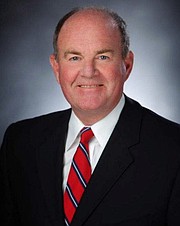Making the grade
Idaho Business for Education gave high rankings, mediocre marks and dismal grades to Idaho lawmakers in its 2022 Legislative Scorecard, released Wednesday.
The scorecard reflects lawmakers' votes on five key education issues:
•House Bill 776 - higher education budget
•House Bill 790 - full-day kindergarten and literacy funding
•Senate Bill 1408 - federal funding for child care
•Senate Bill 1392 - opportunity scholarship for college students
•Senate Bill 1290 - student loan forgiveness for rural teachers.
An "extra credit" was given to House Education Committee members who voted against House Bill 669, which would have provided state funding for private schools.
Sen. Mary Souza, R-Coeur d'Alene, scored a 100% on the Legislative Scorecard.
“I always try to support education," Souza said Wednesday. "I really appreciate some of the innovative and creative ideas that have been brought forward this session.”
Souza was highly rated despite being counted absent during the vote for Senate Bill 1290, regarding loan forgiveness for rural teachers. Souza said she had COVID-19 and her substitute was also out sick that day. However, had she been present, Souza said she would have voted in favor of that bill.
"We’ve had loan forgiveness for rural medical residents and loan forgiveness for rural veterinarians. I have voted in favor of all those," she said. "(SB 1290) would have gotten my vote."
She said her vote in support of full-day kindergarten was strictly to offer it as an option.
"We do not want the government mandating kids must go to all-day kindergarten," she said. "It’s an option and it can help kids who are struggling with literacy and reading issues."
Souza said Idaho education needs creative alternatives to the status quo.
"We need to innovate the system," she said.
She said she thinks parents need to be involved more than they are now.
"The winning equation is a great teacher and parental involvement," she said. "That will equal the student who does much better in school."
Regarding rating systems in general, Souza said she is "very, very tired of outside groups scoring us without knowing our reasons for voting against a bill."
"There's a great proliferation of groups that want to score or rate us or grade us, and those groups often don't have the information we have," she said. "You have to listen to testimony by people who will be impacted, then you have to listen to the floor debate. Then you can make up your mind.
"Just to take the words on the page of the bill and score it is, I think, unjustified. It has been giving a lot of go groups a lot of power,” she continued. "It is not good for lawmakers and it's not good for good policy."
Rep. Paul Amador, R-Coeur d'Alene, also commented on the "report cards" generated by different groups.
"Every entity out there has the ability, if they so choose, to rate legislators on their voting records based on whatever formula they determine," he said.
Amador, a known education advocate, earned an 80% on IBE's Legislative Scorecard.
"I've had a good working relationship with IBE through the years," he said. "I don’t think it's a mystery to anybody I've been a strong proponent for education issues and making sure we have a strong educational system in Idaho."
Amador missed only one mark on the scorecard by voting against SB1290. He said he voted "no" because he is "not a fan of duplicating what can be done to a certain extent already" through federal funding.
"It's treating two types of college graduates who become teachers, putting them in two baskets where one gets a reward and one doesn’t," Amador said. "Not that I don't support ensuring we have highly qualified and well-compensated teachers, especially for rural schools, but there are details in the background that inform my decision making."
Rep. Jim Addis, R-Coeur d'Alene, also earned an 80% ranking and voted against SB1290, as well.
"I don't have anything against loan forgiveness for rural teachers, but I have teachers here in District 4 who aren't rural teachers who may have the same kind of expenses and loans coming out," he said. "We need to work on rural education, but my local teachers here in District 4 work awful hard too. If that's the business we want to get into, we have to consider teachers here in District 4."
He said he supports education bills because "education is essential for our future, for the nation." He and his daughter benefited from great teachers in a great school system, he said.
"We need to pay this forward," Addis said. "We need to ensure that her children have the same opportunities that she has and that I have had.
“I think there will be a strong focus on education moving forward," he said.
Sen. Peter Riggs, R-Post Falls, received a 100% rating from IBE. He said it’s always an honor to be acknowledged for his support of education.
"A lot of my approach to education in Idaho comes from my education here in Idaho," Riggs told The Press via email. "Being born, raised and educated here in Idaho means I’ve had a front row seat to the strengths and weaknesses of our school system."
Riggs attended Idaho schools from kindergarten through 12th grade and earned bachelor’s and master’s degrees from the University of Idaho.
"You would be hard pressed to find someone running for the legislature who is more in touch with, and shaped by, education in Idaho than I am," he said.
Considering his North Idaho education and the local businesses he has helped build in the last 20 years, "I have a keen recognition of the long-term connection that Idaho businesses have with education," he said.
"A lot of people, lacking that real-world experience of what is being taught in our schools and the impact that it has on private sector businesses, seem a little too eager to dismantle our education system in a misguided effort to stop something they don’t fully understand," Riggs said. "Things like reading, writing and arithmetic are foundational to success in school, but we need so much more built on top of that if we’re going to ensure our children are prepared for their lives after school."
Rep. Doug Okuniewicz, R-Dalton Gardens, responded to a request for comment via email. IBE gave him a 20% rating.
"My IBE grade is based on only 5 bills. That seems like a pretty small sample size, when you consider there were 77 education-related bills this past session," he wrote, attaching a list of bills from the 2022 session. "On the other hand, I received the highest rating possible last year from the American Conservative Union."
Here is how other North Idaho legislators scored:
•Sen. Jim Woodward, R-Sagle: 100%
•Rep. Heather Scott, R-Blanchard: 20%
•Rep. Sage Dixon, R-Ponderay: 40%
•Sen. Steve Vick, R-Dalton Gardens: 50%
•Rep. Vito Barbieri, R-Dalton Gardens: 0%
•Rep. Ron Mendive, R-Post Falls: 20%
•Rep. Tony Wisniewski, R-Post Falls: -20%
•Sen. David Nelson, D-Moscow: 100%
•Rep. Brandon Mitchell, R-Moscow: 60%
•Rep. Caroline Nilsson Troy, R-Genesee: 100%
IBE is a nonprofit of more than 250 businesses and business leaders across the state who work to create the workforce Idaho’s employers need and prepare students for success.
“IBE hopes that our Legislative Scorecard can help inform our 252 business leaders and all Idahoans on where their legislators stand on the issues critical to setting our students up for success in school, work and life and creating the highly educated and skilled workforce Idahoans need,” IBE President and CEO Rod Gramer said in a news release.
View the full IBE 2022 Legislative Scorecard online: idahobe.org/legislative-scorecard/







